History of the Jews in Portugal
The history of the Jews in Portugal reaches back over two thousand years and is directly related to Sephardi history, a Jewish ethnic division that represents communities that originated in the Iberian Peninsula (Portugal and Spain).
Before Portugal
Jewish populations have existed in the area even before the country was established, back to the Roman era, or even before – an attested Jewish presence in Portuguese territory, however, can only be documented since 482 CE.[1] With the fall of the Roman Empire, Jews were persecuted by the Visigoths and other European Christian kingdoms which controlled the area after that period.
In 711, the Moorish invasion of the Iberian Peninsula was seen by the many in the Jewish population as a liberation, and marked as the beginning of what many have seen as the Golden age of Jewish culture in the Iberian Peninsula (the Islamic Al-Andalus), even if the Jews, as well as the Christians (the Mozarabs of the Visigothic rite), under Muslim rule were considered Dhimmi, and had to pay a special tax.
Rapidly in the 8th century, the Christian kingdoms of the north mountainous areas of the Iberian Peninsula (Kingdom of Asturias) started a long military campaign against the Muslim invaders, the Reconquista. The Jews, since many knew the Arabic language, were used by the Christians as both spies and diplomats on this campaign that took centuries. This granted them some respect, although there was always prejudice.
_in_Manhattan%2C_New_York_City.jpg)
Medieval Era
King Afonso I of Portugal entrusted Yahia Ben Yahi III with the post of supervisor of tax collection and nominated him the first Chief-Rabbi of Portugal (a position always appointed by the King of Portugal). King Sancho I of Portugal continued his father's policy, making Jose Ibn-Yahya, the grandson of Yahia Ben Rabbi, High Steward of the Realm. The clergy, however, invoking the restrictions of the Fourth Council of the Lateran, brought considerable pressure to bear against the Jews during the reign of King Dinis I of Portugal, but the monarch maintained a conciliatory position.
Until the 15th century, some Jews occupied prominent places in Portuguese political and economical life. For example, Isaac Abrabanel was the treasurer of King Afonso V of Portugal. Many also had an active role in the Portuguese culture, and they kept their reputation of diplomats and merchants. By this time, Lisbon and Évora were home to important Jewish communities.
Portuguese discoveries
In 1497, Vasco da Gama took Abraham Zacuto's tables and the astrolabe with him on the maiden trip to India.[2] It would continue to be used by Portuguese ships thereafter to reach far destinations such as Brazil and India.[3]
Zacuto might have an uncredited appearance in Luís de Camões's 1572 epic poem, The Lusiad, as the unnamed "old man of Restelo beach", a Cassandra-like character that surges forward just before Vasco da Gama's departure to chide the vanity of fame and warn of the travails that await him (Canto IV, v.94-111). This may be Camões' poetic interpretation of an alleged meeting (reported in Gaspar Correia) between Vasco da Gama and the older Abraham Zacuto at a monastery by Belém beach, just before his fleet's departure, in which Zacuto reportedly gave Gama some final navigational tips and warned him of dangers to avoid.[4]
The so-called Amazonian Jews did not arrive in Brazil during the colonial era, but rather are descended from Moroccan Jews who immigrated to the Amazon region during the Amazon rubber boom.
Inquisition
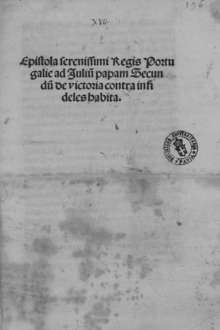
In 1492, Spain expelled its Jewish population as part of the Spanish Inquisition. Tens of thousands of Spanish Jews subsequently fled to Portugal, where King John II granted them asylum in return for payment. However, the asylum was only temporary—after eight months, the Portuguese government decreed the enslavement of all Jews who had not yet left the country. In 1493, King John deported several hundred Jewish children to the newly discovered colony of São Tomé, where many of them perished.[5]
Following John's death in 1494, the new king Manuel I of Portugal restored the freedom of the Jews. However, in 1497, under the pressure of the newly born Spanish State through the clause Marriage of Isabella, Princess of Asturias, the Church and also of part of the Christian people, King Manuel I of Portugal decreed that all Jews had to convert to Christianity or leave the country without their children.[6] Hard times followed for the Portuguese Jews, with the massacre of 2000 individuals in Lisbon in 1506, further forced deportations to São Tomé (where there is still a Jewish presence today), and the later and even more relevant establishment of the Portuguese Inquisition in 1536.
The Inquisition held its first Auto da fé in Portugal in 1540. Like the Spanish Inquisition, it concentrated its efforts on rooting out converts from other faiths (overwhelmingly Judaism) who did not adhere to the strictures of Catholic orthodoxy; like in Spain, the Portuguese inquisitors mostly targeted the Jewish New Christians, conversos, or marranos. The Portuguese Inquisition expanded its scope of operations from Portugal to the Portuguese Empire, including Brazil, Cape Verde, and India. According to Henry Charles Lea[7] between 1540 and 1794 tribunals in Lisbon, Porto, Coimbra and Évora burned 1,175 persons, another 633 were burned in effigy and 29,590 were penanced. The Portuguese inquisition was extinguished in 1821 by the "General Extraordinary and Constituent Courts of the Portuguese Nation".
Most Portuguese Jews, thousands, would eventually leave the country to Amsterdam, Thessaloniki, Constantinople (Istanbul), France, Morocco, Brazil, Curaçao and the Antilles. In some of these places their presence can still be witnessed, like the use of the Ladino language by some Jewish communities in Turkey, the Portuguese based dialects of the Antilles, or the multiple Synagogues built by what was to be known as the Spanish and Portuguese Jews (such as the Amsterdam Esnoga).
Post-Inquisition
Despite persecution, many conversos of Jewish ancestry did stay in Portugal. A significant number converted to Christianity as a mere formality, practicing their Jewish faith in secret. These Crypto-Jews were known as New Christians, and would always be under the constant surveillance of the Inquisition – many, if not most of these, would eventually leave the country in the centuries to come and again embrace openly their Jewish faith, joining the communities of Spanish and Portuguese Jews in places like Amsterdam, London or Livorno. (Such was the case, for example, of the family of Baruch Spinoza).
Some of the most famous descendants of Portuguese Jews who lived outside Portugal are the philosopher Baruch Spinoza (from Portuguese Bento de Espinosa), and the classical economist David Ricardo.
Some Jews, very few, like the Belmonte Jews, went for a different and radical solution, practicing their faith in a strict secret isolated community. Known as the Marranos, some have survived until today (basically only the community from Belmonte, plus some more isolated families) by the practice of inmarriage and few cultural contact with the outside world. Only recently have they re-established contact with the international Jewish community and openly practice religion in a public synagogue with a formal rabbi.
In the 19th century, some affluent families of Sephardi Jewish Portuguese origin, namely from Morocco, returned to Portugal (such as the Ruah and Bensaude). The first synagogue to be built in Portugal since the 15th century was the Lisbon Synagogue, inaugurated in 1904.
World War II
A new chapter of Jews in Portugal was marked by World War II. Since 1929 Portugal was under the nationalist regime of António de Oliveira Salazar, but Portuguese Nationalism was not grounded on race or biology. In 1934 Salazar made it clear that Portuguese Nationalism did not include pagan anti-human ideals that glorified a race, and in 1937, he published a book where he criticized the ideals behind the Nuremberg laws.[8] In 1938, he sent a telegram to the Portuguese Embassy in Berlin ordering that it should be made clear to the German Reich that Portuguese law did not allow any distinction based on race and therefore Portuguese Jewish citizens could not be discriminated against.[9]
In 1937, Adolfo Benarus, Honorary Chairman of COMASSIS[10] and a leader of the Lisbon’s Jewish Community published a book where he rejoiced with the fact that there was no anti-Semitism in Portugal.[11]
Portuguese Jewish scholar and economist Moses Amzalak, leader of the Lisbon Jewish community for more than fifty years (from 1926 until 1978), believed that Nazis were defending Europe from communism. Later, when Nazi anti-Semitic policies became evident, Amzalak got actively involved in rescue operations leveraging his friendship with Salazar.
Yad Vashem historian Avraham Milgram says that modern anti-Semitism failed "to establish even a toehold in Portugal"[12] while it grew racist and virulent elsewhere in early twentieth-century Europe.
Early in September 1939, Portugal proclaimed its neutrality to combat threats to its colonial possessions from nations in both the Allied and Axis camps. Nonetheless, its sympathies were clearly on the side of the allies following Germany's invasion of the Catholic nation of Poland.
Upon the declaration of war, the Portuguese Government announced that the Anglo-Portuguese Alliance remained intact, but since the British did not seek Portuguese assistance, Portugal would remain neutral. The British Government confirmed the understanding. From the British perspective, Portuguese non-belligerency was essential to keep Spain from entering the war on the side of the Axis."[13]
Germany's invasion of France brought the Nazis to the Pyrenees which allowed Hitler to bring unanticipated pressures on both Spain and Portugal.[14]
At the outbreak of World War II, to the nearly 400 Jews that were living in Portugal an additional 650 Jewish refugees from Central Europe were granted a quasi-resident status. However, under threat of military action from the Nazis Salazar issued orders on November 11, 1939, that consuls were not to issue Portuguese visas to "foreigners of indefinite or contested nationality; the stateless; or Jews expelled from their countries of origin". This order was followed only six months later by one stating that "under no circumstances" were visas to be issued without prior case-by-case approval from Lisbon.
The Jewish community on the island of Madeira also grew in 1940, due to the Evacuation of the Gibraltarian civilian population during World War II to Madeira, which included a number of Jews, who attended the Synagogue of Funchal. Some of these evacuees were buried in the Jewish Cemetery of Funchal.[15]
Portugal’s regime did not distinguish between Jews and non-Jews but rather between immigrant Jews who came and had the means to leave the country and those lacking them. Portugal prevented Jews from putting down roots in the country not because they were Jews but because the regime feared foreign influence in general, and feared the entrance of Bolsheviks and left-wing agitators fleeing from Germany.[16] Antisemitic ideological patterns had no hold in the ruling structure of the “Estado Novo” and a fortiori in the various strata of Portuguese society.[17]
Following the Nazi invasion of Russia which cut off their supply of wolfram (tungsten) from Asia, Germany initiated tactics to extract wolfram from Portugal, initially by artificially running up prices in an attempt to get the people to bypass the Portuguese government and sell directly to German Agents. Salazar's government attempted to limit this and in October 1941 Germany retaliated by sinking a Portuguese merchant ship, the first neutral ship to be attacked during World War II. Germany then torpedoed a second Portuguese ship in December. England then invoked long-standing treaties with Portugal dating from 1373 (Anglo-Portuguese Alliance) and 1386 (Treaty of Windsor) and Portugal honored these by granting a military base in the Azores to the Allies. The Allies then promised all possible aid in the event of a German attack against Portugal. Portugal continued to export wolfram and other goods to both Allied countries and Germany (partly via Switzerland) until 1944 when Portugal declared a total embargo of wolfram to Germany.[14]
Despite Salazar's strict policy, efforts to provide entry visas into Portugal to Jews via rescue operations continued. The number of refugees that has escaped through Portugal during the war has estimates that range from one hundred thousand to one million. An impressive number considering the size of the country’s population at that time (circa 6 million).[18] "In 1940 Lisbon, happiness was staged so that God could believe it still existed," wrote the French writer Antoine de Saint-Exupery.[19] The Portuguese capital became a symbol of hope for many refugees. Even Isla and Rick, the star-crossed lovers in the film Casablanca, sought a ticket to that "great embarkation point." Thousands had flooded the city, trying to obtain the documents necessary to escape to the United States or Palestine. Not all found their way.
The number of visas issued by Aristides de Sousa Mendes, Portuguese consul in Paris, cannot be determined. There is no consensus on the number of refugees that used Portugal as a scape route in those early days of World War II. Yehuda Bauer says that the number of visas must have been close to 10,000[20] and that is the number of refugees who actually reached Portugal in the summer of 1940. But then he adds that of these 10,000 “not all of them received visas from Mendes, but a very high proportion must have”. To reach a more accurate figure one would need to count the visas granted by the Portuguese consulates at: Rotterdam, Den Hague, Antwerp, Paris, Toulouse, Berlin, Geneva, etc. and according to Yad Vashem historian Avraham Milgram in a study from 1999 published by the Shoah Resource Center, International School for Holocaust Studies,[21] a slight analysis of the list of visas granted by Sousa Mendes to Jews and non-Jews in May and June 1940, shows — without diminishing the greatness of his attitude — that the number of visas granted by the consul was lower than the numbers mentioned in the literature, raising a series of questions relative to Portugal and to the entry of Jewish refugees. Milgram concludes that the discrepancy between the reality and the myth of the number of visas granted by Sousa Mendes is great.
More recently, in 2011, Milgram published a densely researched book, “Portugal Salazar and the Jews” where he challenges again the long-established but fuzzy numbers of the Sousa Mendes disobedience episode. To make his point on the exaggeration of the numbers Milgram also cross checks the Bordeaux numbers with those of the HICEM reports. According to HICEM reports, only 1,538 Jews who came to Portugal as refugees without visas to other countries sailed from Lisbon in the second half of 1940, and an additional 4,908 Jews, with the help of HICEM, sailed during 1941. To this number one should add approximately 2,000 Jews who came directly from Italy, Germany, and countries annexed by the Germans armed with American visas. In total, in the eighteen months from July 1940 to December 1941, the HICEM took care of the sea transport of 8,346 Jews who left Lisbon for trans-Atlantic countries.
Because of his heroic efforts in opening up a refugee escape route, Sousa Mendes has been honored by Israel as one of the Righteous Among The Nations. The escape route remained active throughout the war allowing an estimated million refugees to escape from the Nazis through Portugal during World War II.[22]
Sousa Mendes never lost his title as he kept on being listed in the Portuguese Diplomatic Yearbook until 1954, he ended up never retiring and kept on receiving his full Consul salary, 1,593 Portuguese Escudos,[23][24] until the day he died.[25] This was a customary procedure in the Portuguese foreign office, known as “disponibilidade” (meaning “on-call”), diplomats and consuls never retired so they could keep on receiving their full salary. Rui Afonso, a Sousa Mendes biographer, also cites the monthly 1,593 Portuguese Escudos and remarks: "although it was not a salary of a prince, one should not forget that at that time, in Portugal, the salary of a school teacher was only 500 Escudos. Sousa Mendes was therefore receiving a salary that was three times the salary of a school teacher.[26]
Sousa Mendes' actions were not unique. Issuing visas in contravention of instructions was widespread at Portuguese consulates all over Europe.[27]
Other cases were supported by Salazar. The Portuguese Ambassador in Budapest, Carlos Sampaio Garrido and the Chargé d'Affaires Carlos de Liz-Texeira Branquinho helped an estimated 1,000 Hungarian Jews in 1944. They rented houses and apartments in the outskirts of Budapest to shelter and protect refugees from deportation and murder. On April 28, 1944 the Hungarian secret police (counterparts to the Gestapo) raided the Ambassador's home arresting his guests, the Ambassador physically resisted the police, was also arrested, but managed to have his guests released on the grounds of ex-territorially of diplomatic legations. In 2010 Sampaio Garrido was recognized as Righteous Among the Nations by Yad Vashem.
Other Portuguese who deserve further credit for saving Jews during the war are Professor Francisco Paula Leite Pinto and Moisés Bensabat Amzalak. A devoted Jew, and a Salazar supporter, Amzalak headed the Lisbon Jewish community for more than fifty years (from 1926 until 1978).
Communities
The roots of Portuguese Jewry lay much prior to the forging of the Portuguese kingdom. When Afonso I of Portugal obtained recognition of his independent kingdom, in 1143, Jews had lived in the Iberian Peninsula for at least one millennium.[28] Jews differed from other people since they always considered themselves a nation in exile, whose millennial longing was to return to their land. Nurturing no territorial ambitions wherever they found asylum, Jews solely contributed to the prosperity of their host countries which ensured a good reception.
Nevertheless, there were times when Jews were not welcome. With the Edict of expulsion of the Jews by Manuel I (1496) and the official establishment of the Portuguese Inquisition by John III (1536) came a period of intolerance and prejudice that lasted for several centuries and led to the almost complete extermination of Judaism and the Jews in Portugal.[29] It wasn’t until the twentieth century that organized Jewish communities settled again in Portugal.
Lisbon
The Jewish Community of Lisbon was officially recognized in 1913. It brings together the Jews of Lisbon. Its headquarters are on Avenida Alexandre Herculano, no.59 in Lisbon, where the synagogue Shaaré Tikvah (Gates of Hope) is located. According to its official website, the purpose of the Jewish Community of Lisbon is to promote religious education for the new generations according to the values of Judaism, to recruit new members and to strengthen its engagement in the local and national affairs, by means of dialogue and interaction with the authorities as well as with civil and religious institutions.
Between 2004 and 2012 there was also a vibrant Conservative Jewish Community - Kehilat Beit Israel. Beit Israel had an innovative approach counting women for minyan and making a bridge between the old community and the outside world. Due to the economical crisis and mass immigration the community was dismantled.
- Shaaré Tikvah synagogue
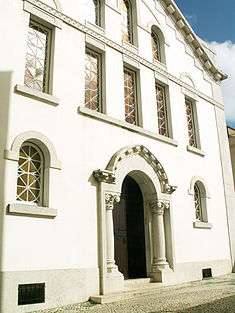 Facade
Facade- Interior
Porto
The Jewish Community of Porto was officially recognized in 1923. It brings together the Jews from Porto. Its headquarters are located in Rua de Guerra Junqueiro, no. 340, in Porto, where the Kadoorie Synagogue "Mekor Haim" (Fountain of Life) is located, the largest synagogue in the Iberian Peninsula and one of the largest in Europe. According to the official website of the Jewish Community of Porto, it is ruled by the philosophy of Chabad Lubavitch and among its members one finds Jews from sources as diverse as Egypt, India, Russia, United States, Poland, Spain, Israel, Portugal, Mexico and Venezuela.
- Kadoorie Mekor Haim synagogue
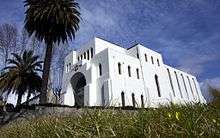 Facade
Facade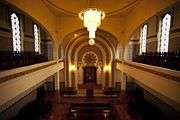 Interior
Interior
Belmonte
The Jewish community of Belmonte was officially recognized in 1989. It brings together the Jews of Belmonte and its surroundings. Its headquarters are located in Rua Fonte Rosa, 6250-041, Belmonte, where the Synagogue Beit Eliahu (House of Elijah) was built. According to the official blog of the Jewish community of Belmonte, this is the only community in Portugal that can be considered truly Portuguese. Its members are descendants of crypto-Jews that managed to preserve many of the rites, prayers and social relations throughout the period of the Inquisition, marrying inside a community constituted by a few families.
- Beit Eliahu synagogue
 Facade
Facade
History of the Jews in Madeira
Present
In 1987 the then President Mário Soares, for the first time in the History of Portugal, asked forgiveness to the Jewish communities of Portuguese origin for Portugal's responsibility in the Inquisition and all the past persecutions of Jews.
At present there are numerous Jewish cultural heritage sites in Portugal,[30] including five synagogues in the country, in Lisbon (Sha'aré Tikvá – Orthodox/ Ohel Yaakov – Conservative[31]), Porto (Mekor Haim), Ponta Delgada in the Azores islands (Porta do Céu – Shaar ha-Shamain) and Belmonte (Bet Eliahu), and several private places where the Jewish community meets. There are a series of kosher products being produced in Portugal including wine.
It is hard to say how many Jews live in Portugal. The Portuguese census estimated a Jewish population of 5,000 individuals in 2001, with a between-census estimate in 2006 of 8,000. The CIA World Factbook refers a smaller number of a thousand Jews, mainly central European Holocaust survivors. But the Marranos (Crypto-Jews) and returned Sephardim represent the remainder.
According to a 2008 study by the American Journal of Human Genetics, 19.8% of the Portuguese population has some degree of Jewish ancestry. The genetic signatures of people in the Iberian Peninsula provide new evidence that the number of Jews forced to convert to Christianity during Catholic rule in the 15th and 16th centuries was much greater than historians believed.[32] Some Portuguese personalities are known Jews or descendants of Jews, most notably Esther Mucznik (leader of the Israelite Community of Lisbon), the award-winning photographer Daniel Blaufuks, screen actress Daniela Ruah, former Lisbon Mayor Nuno Krus Abecassis, and the former President of the Republic Jorge Sampaio, whose grandmother was a Moroccan Jew of Portuguese-Jewish origin. And although Sampaio does not consider himself Jewish, stating that he is agnostic, he is considered an ethnic Jew, since the Jewish law Halakha asserts that all individuals whose mothers are Jewish, despite of religious belief, to be Jewish themselves.[33]
Notable Portuguese Jews
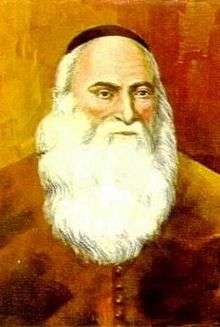

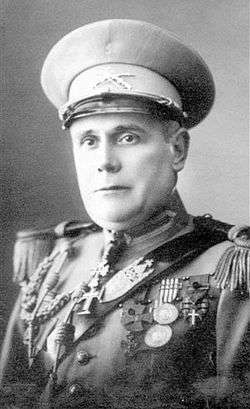
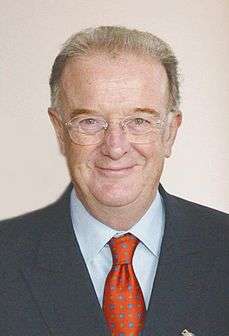

- Aaron Lopez
- Abraham Caceres
- Abraham Israel Pereyra
- Abraham Usque
- Abraham Zacuto
- Abraham Pais
- Alexander Teixeira de Mattos
- Antonio Fernandez Carvajal
- António José da Silva
- Antonio de Montesinos
- Artur Carlos de Barros Basto
- Baruch Spinoza
- Benjamin N. Cardozo
- Basil Henriques
- Catulle Mendès
- Camille Pissarro
- Daniel Blaufuks
- Daniel Mendoza
- Daniela Ruah
- David Ricardo
- Emma Lazarus
- Ephraim d'Aguilar
- Federigo Enriques
- Francisco Lopes Suasso
- Francisca Nunez de Carabajal
- Garcia de Orta
- Grace Aguilar
- Henri Castro
- Isaac Abrabanel
- Isaac Cardoso
- Isaac da Costa
- Isaac de Pinto
- Isaac de Sequeira Samuda
- Jacob de Castro Sarmento
- Jacob Rodrigues Pereira
- Joseph Nasi
- Joseph Salvador
- Jorge Sampaio
- Judah Leon Abravanel
- Judah Touro
- Lewis Goldsmith
- Luis de Carabajal y Cueva[34]
- Menasseh Ben Israel
- Moisés Bensabat Amzalak
- Mordecai Manuel Noah
- Moses da Costa
- Pierre Mendès France
- Rehuel Lobatto
- Robert Henriques
- Rodrigo López
- Sam Costa
- Samuel Nunez
- Samuel Sarphati
- Uriel da Costa
- Vic Seixas
See also
- History of the Jews in Madeira
- Spanish and Portuguese Jews
- Portuguese Inquisition
- Goa Inquisition
- Judeo-Portuguese
- History of the Jews in the Netherlands
- History of the Jews in Latin America
- History of the Jews in England
- History of the Jews in Spain
- History of the Jews in Jamaica
- Pallache family
- Pallache (surname)
Notes
- ↑ Jorge Martins (2006), Portugal e os Judeus: Volume I – dos primórdios da nacionalidade à legislação pombalina, Lisboa, Vega.
- ↑ Although it took a little time to adapt. João de Barros (1552) Decadas de Asia Dec. 1.2, p.280-81, relates how Vasco da Gama, arriving at the Bay of St. Helen in November 1497, disembarked to take the readings because he did not quite trust the new-fangled astrolabe on board. Physician-astronomer Master João Faras, aboard the fleet of Pedro Álvares Cabral, upon landing in Brazil in 1500, also complains about the astrolabe readings at sea. But pilot João de Lisboa (writing c. 1514) indicates the use of astrolabe and tables were already perfected and routine. See Albuquerque, Luís de, “Introdução”, in 1986 ed. of Abraão Zacuto, Almanach Perpetuum, Lisbon: Imprensa Nacional Casa da Moeda
- ↑ Velho, A. A journal of the first voyage of Vasco da Gama, 1497-1499. p. 168. ISBN 9785872234647. Retrieved 11 June 2014.
- ↑ Gaspar Correia (c. 1550s) Lendas da India, (p.23)
- ↑ Marcus, Jacob (1938). The Jew in the Medieval World: A Source Book, 315-1791. p. 61.
- ↑ Lowenstein, Steven (2001). The Jewish Cultural Tapestry: International Jewish Folk Traditions. Oxford University Press. p. 36.
- ↑ Henry Charles Lea, A History of the Inquisition of Spain, vol. 3, Book 8.
- ↑ Salazar, António de Oliveira – “Como se Levanta um Estado”, ISBN 9789899537705
- ↑ Dez anos de Politica Externa, Vol 1, pag 137. Edicao Imprensa Nacional 1961
- ↑ Portuguese Committee for the Assistance of Jewish Refugees in Portugal (COMASSIS), which was led by Augusto Esaguy and Elias Baruel, and had Moses Amzalak and Adolfo Benarus as its honorary chairmen.
- ↑ Benarus, Adolfo – “O Antisemitismo” - 1937 (Lisboa : Sociedade Nacional de Tipografia)
- ↑ Avraham Milgram, Portugal, Salazar, and the Jews, Jerusalem: Yad Vashem, 2011, p.11.
- ↑ Leite, Joaquim da Costa. "Neutrality by Agreement: Portugal and the British Alliance in World War II." American University International Law Review 14, no. 1 (1998): 185-199
- 1 2 The New History of Portugal, H.V. Livermore, Cambridge University Press, 1969
- ↑ Jono David (2015). "MADEIRA (Portugal), Funchal. Jewish Cemetery (8.2015)". HaChayim HaYehudim Jewish Photo Library. Retrieved 2015-12-20.
- ↑ Milgram, Avraham. "Portugal, Salazar, and the Jews", translated by Naftali Greenwood. Jerusalem, Yad Vashem, 2011, (page 266) ISBN 978-965-308-387-5
- ↑ Milgram, Avraham. "Portugal, Salazar, and the Jews", Publication Date: March 20, 2012 ISBN 978-9653083875 pp 13
- ↑ Neil Lochery estimates a high end number of one million - Lochery, Neill - "Lisbon: War in the Shadows of the City of Light, 1939–45", Public Affairs; 1 edition (November 1, 2011), ISBN 1586488791
- ↑ Saint-Exupery escaped from France to Portugal and ended up in Lisbon, waiting for a visa to go to America
- ↑ American Jewry and the Holocaust: The American Jewish Joint Distribution Committee, 1939–1945, p. 44, ISBN 0-8143-1672-7
- ↑ Portugal, the Consuls, and the Jewish Refugees, 1938–1941 • Avraham Milgram, Shoah Resource Center, International School for Holocaust Studies
- ↑ See , "The Jews Of Portugal: Contemporary Sites And Events Aristides de Sousa Mendes: A Moral Model For The World" published on the International Raoul Wallenberg Foundation website
- ↑ Documents from Arquivo Digital Ministerio das Financas ACMF/Arquivo/DGCP/07/005/003
- ↑ http://badigital.sgmf.pt/Arquivo-DGCP--07---005---003/1/
- ↑ Several other sources also mention the monthly allowance that Sousa Mendes received until his death in 1954: A letter that Sousa Mendes wrote to the Portuguese Bar Association, Ordem dos Advogados - Secretaria do Conselho Geral, Lisboa, Cota - Processo nº 10/1931 Date 1946.04.29 where he says that he is receiving a monthly salary of 1,593 Portuguese Escudos. Other source: Wheeler, Douglas L., "And Who Is My Neighbor? A World War II Hero of Conscience for Portugal," Luso-Brazilian Review 26:1 (Summer, 1989): 119-39.
- ↑ Afonso, Rui - Um Homem Bom, Aristides de Sousa Mendes, O "Wallenberg" Portugues, Ed Caminho, pag 257
- ↑ Milgram, Avraham. "Portugal, Salazar, and the Jews", translated by Naftali Greenwood. Jerusalem, Yad Vashem, 2011, (page 89) ISBN 978-965-308-387-5
- ↑ STEINHARDT, Inácio - Raízes dos judeus em Portugal: entre Godos e Sarracenos. [S.l.]: Nova Vega, 2012
- ↑ TÁVARES, Maria José Pimenta Ferro - Judaísmo e Inquisição: Estudos. Lisboa: Presença, 1987
- ↑ See , An Online Resource of Jewish Heritage in Portugal
- ↑ Strictly speaking, the community is called Beit Israel: Ohel Yaakov is the former Orthodox Ashkenazi synagogue in which it meets: http://www.masorti.eu/index.php/partner-organizations/beit-israel-lisbon-portugal
- ↑ "The Genetic Legacy of Religious Diversity and Intolerance: Paternal Lineages of Christians, Jews, and Muslims in the Iberian Peninsula". ncbi.nlm.nih.gov. Retrieved 1 October 2014.
- ↑ See , retrieved from the Jerusalem Post of 7 November, 2003:
Jerusalem Post: I understand that you have Jewish ancestry in your family. What is your personal connection to the Jewish people? Do you consider yourself to be a Jew?.
Jorge Sampaio: My grandmother belonged to a Jewish family that came from Morocco in the beginning of the 19th century. She married a non-Jewish naval officer who later was Foreign Affairs minister. I am naturally very proud of this ancestry and of all those that I call my "favorite Jewish cousins," one of whom is the president of the Lisbon Jewish Community, as I am proud of the ancestry on my non-Jewish father's side. Personally, I am agnostic, and I do not consider myself a Jew; but I am proud, as I said, of my ancestors.
- ↑ C. K. Landis, Carabajal the Jew, a Legend of Monterey, Vineland, N. J., 1894.
References
- Alexandre Herculano, História da Origem e Estabelecimento da Inquisição em Portugal (English: History of the Origin and Establishment of the Inquisition in Portugal, translation of 1926).
- Henry Charles Lea, A History of the Inquisition of Spain, vol. 3, Book 8.
- Jorge Martins (2006), Portugal e os Judeus: Volume I – Dos primórdios da nacionalidade à legislação pombalina, Lisboa, Vega.
- Jorge Martins (2006), Portugal e os Judeus: Volume II – Do ressurgimento das comunidades judaicas à Primeira República, Lisboa, Vega.
- Jorge Martins (2006), Portugal e os Judeus: Volume III – Judaísmo e anti-semitismo no século XX, Lisboa, Vega.
- The New History of Portugal, ed H.V. Livermore, Cambridge University Press, 1969.
External links
- Index of the court proceedings and other documents of the Portuguese Inquisition (in Portuguese)
- "Kehilat Beit Israel - Comunidade Judaica Masorti de Lisboa - Masorti Olami". masortiworld.org. Retrieved 1 October 2014.
- Website of Lisbon Israelite community
- Website of Porto Israelite community
- Blogue of Belmonte Jewish community

